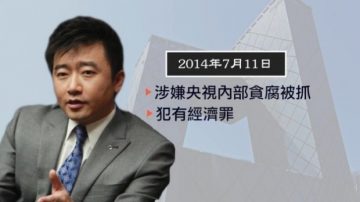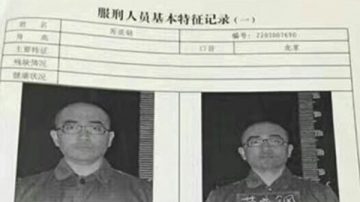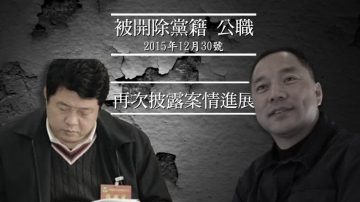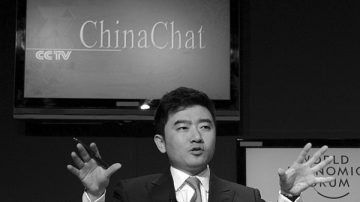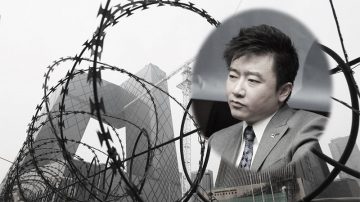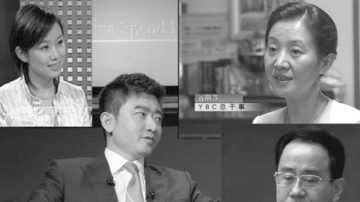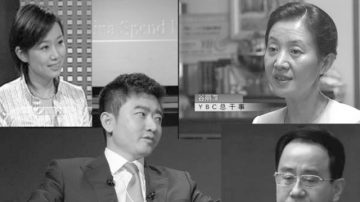【新唐人2014年01月21日訊】大陸搖滾歌手崔健因拒絕接受審查制度,決定不參加《央視》春晚節目。崔健的決定得到了大陸各界的廣泛支持。他們表達了對崔健堅持不妥協的讚賞和敬佩。一名搖滾歌手說﹕「感謝崔健!保存了搖滾樂的最後一點顏面。」「給小子們樹了標桿」。
上週五,崔健的經紀人尤尤向《新唐人》證實,由於崔健打算在《央視》春晚節目演唱的歌曲《一無所有》沒有通過審查,而崔健又拒絕更換《央視》安排的歌曲《花房姑娘》,因此「退出春晚」。
崔健的決定,得到了大陸歌迷、藝術家、學者、媒體人等各界的廣泛支持。
北京藝術家、獨立製片人楊偉東:「我覺得這是作為一個藝術家最基本的良知。中國現在這種現狀,我覺得出現這是一個最有力的、而且一個表達自己的態度和立場,尤其是藝術家創作的一種自由吧!在中國,這種當代藝術界這些所謂成功的藝術家,跟錢發生關係之後,對社會這種意見的表達,已經沒有了。我覺得這很好的給中國的藝術家們起到了典範作用。」
曾經在去年「因言獲罪」的北京搖滾樂隊主唱吳虹飛,也在微博中說:「感謝崔健!保存了搖滾樂的最後一點顏面。不是每個人都靠妥協和諂媚活下來的……謝謝你,給小子們樹了標桿。我素來認為,文學,音樂都有其道德,這裡包括了,不合作。」
今年52歲的崔健,曾經在1989年天安門廣場上演出,慰問當時為爭取中國民主而絕食抗議的學生。他的成名作《一無所有》,成為了當時天安門廣場學生傳唱的歌曲之一。而崔健也因此長期遭到當局打壓。
美國洛杉磯民運人士鄭存柱:「崔健是89一代的像徵,他的歌聲裡邊有很多表達89一代那樣的心聲。」
大陸詩人、文化評論家葉匡政:「因為崔健這些年一直被視為中國音樂的良心,他身上這種反抗的力量,一直被視為中國搖滾精神重要的來源。他這麼多年來,一直...主流媒體基本上拒絕他到,是他江湖影響力啊,包括他音樂良心的一個像徵。如果說,現在仍然與體制有對抗的一個音樂人物的話,崔健肯定是排在前列的。」
今年是「六四運動」25週年,恰逢這個敏感的時期,《央視》春晚主辦方邀請具叛逆精神的崔健上節目,令外界猜測。
天安門民主女神雕塑家陳維明:「這一次為甚麼會引起轟動,也是因為25週年就要到來之際,官方當然希望把所有的原來六四的人都進行招安,打扮裝修成一個非常美妙和諧的社會。其實現在中國就像一個火山口一樣,非常的危險。所以共產黨當然要打扮成一個紳士,它拉攏各種各樣的精英、有名藝術家。包括我也有人希望我回去。如果立場不是特別堅定,是很容易被拉下水去的。」
雖然失去了在春晚登臺的機會,但崔健卻贏得了八九民運那一代人的尊重和佩服。
陳維明:「他的不參與,從兩個方面,個人的方面,我認為他從道德和政治意識方面,那他的立場是完全正確的,我認為,也是符合了那一代人的期望;另外一方面,因為現在中國大陸很多都犬儒化了,很多藝術家。他在這種誘惑面前他能堅持住,我是非常佩服。他堅持了正義、堅持了良知、堅持了道德。」
葉匡政表示:「春晚」實際上是當局用來體現政府權威的「政治儀式」。假如崔健上春晚了,並不代表「春晚」開始尊重民間的話語權了,相反的,卻可能是民間話語權和反叛、獨立精神對國家意志的服從及妥協。因此,崔健不上春晚,是最正確的選擇。
大陸文化批評人士朱大可在微博上寫道:「崔健能否被上春晚,是一個很好的文化試金石。是不是裝大度、裝開放、裝繁榮、裝盛世、總而言之,一試,便都清楚了。」
採訪/易如 編輯/張天宇 後製/孫寧
Cui Jian Praised for Refusing CCTV New Year Show
The Chinese rock singer Cui Jian has rejected an invitation to perform at the Chinese Communist Party Spring Festival Eve Gala TV Show.
Cui Jian is standing against censorship, and his decision has received wide support among Chinese people.They have expressed their appreciation
and admiration toward Cui Jian's insistence. Another rock star said, "thanks to Cui Jian, for saving the last bit of face of rock! You set the standard for us."
On Friday, Cui Jian's agent spoke to an NTD reporter.
The song Cui Jian had intended to sing at the show, "Yiwu Suoyou"(Nothing to my Name) was not accepted.Cui Jian refused to sing the one arranged by CCTV, and therefore turned down his invitation.
Cui Jian's decision has been widely supported by Chinese fans, artists, academics, and the media.
Yang Weidong, Beijing artist and independent filmmaker: "I think this is the most basic conscience as an artist.This is the most powerful expression of his stance and free will as an artist, under the current situation in China.Contemporary artists who are considered successful would lose their voice, once they became connected with money.I believe this is setting up a very good example to artists in China today."
Wu Hongfei is a Beijing-based rock band lead singer who was charged by the regime for his speeches last year.He commented on Weibo: "Thanks to Cui Jian, for saving the last bit of face of rock. Not everyone survives by relying on compromise and flattery… thank you, you set the standard for us.I have always believed that literature and music have a moral standard, which includes non-cooperation."
52 year old Cui Jian performed in 1989 at Tiananmen Square, to show his support to the students who were on a hunger strike to protest for democracy in China.
His hit song, "Yiwu Suoyou" was widely sung by the students in the Square.
Since then, Cui Jian has also been suppressed by the regime.
Cheng Cunzhu, democratic activist in Los Angeles: "Cui Jian is a symbol of 1989.
His voice conveys the voices of 1989."
Ye Kuangzheng, poet and culture critic: "Cui Jian has been regarded as the conscience of Chinese music all these years. His strength to rebel has been regarded as an important source of Chinese rock and roll spirit. For years, mainstream media refused to give him a platform.But his influence has been widespread, due to the conscience in his music. If there is still a musical figure who confronts the regime, Cui Jian is definitely on top of that list."
This year marks the 25th anniversary of the 1989 Tiananmen Square Student Movement. The invitation of Cui Jian onto the CCTV Chinese New Year show at this sensitive time drew much speculation.
Chen Weiming, creator of the 1989 Statue of Democracy in Tiananmen Square: "This sensation was caused by the upcoming 25th anniversary of the June fourth massacre.
The regime intends to accept an amnesty, surrender from those participants, and create an image of social harmony.In fact, China is like a volcano ready to erupt at any time.
The Communist Party is pretentious, to be the gentlemen to attract elites, famous artists, and even me. I was recruited too. Those who don't stand firm can easily give in."
Despite losing the opportunity to stage the show, Cui Jian has won the respect and admiration from those who were involved in the June 4 incident.
Chen Weiming: "His refusing to go on the show has two meanings. At a personal level, I believe his stance, with moral and political awareness, is absolutely correct. I believe that it is in line with the expectations of the people of that generation."
On the other hand, many artists have
become cynical in modern China. Facing this temptation, he is able to hold on
to his dignity, which I was very impressed by.He has insisted on justice, upheld his conscience, and adhered to his ethics."
Chinese cultural scholar Ye Kuangzheng indicates that the Communist New Year show has always been a political ritual to display the regime's authority.
If Cui Jian shows up on stage, it does not mean any respect to the rights of expression. Rather, it would indicate an obedience to the authorities, and
compromise of his rights of speech, independence, and spirit. Therefore, Cui Jian has made the right choice.
Cultural commentator Zhu Dake wrote on Weibo that, "whether Cui Jian can be made to show up at the show is a good touchstone. This will give a clear answer as to whether the regime is pretentious in generosity, openness, prosperity."
Interview/YiRu Edit/Zhang Tianyu Post-Production/SunNing
上週五,崔健的經紀人尤尤向《新唐人》證實,由於崔健打算在《央視》春晚節目演唱的歌曲《一無所有》沒有通過審查,而崔健又拒絕更換《央視》安排的歌曲《花房姑娘》,因此「退出春晚」。
崔健的決定,得到了大陸歌迷、藝術家、學者、媒體人等各界的廣泛支持。
北京藝術家、獨立製片人楊偉東:「我覺得這是作為一個藝術家最基本的良知。中國現在這種現狀,我覺得出現這是一個最有力的、而且一個表達自己的態度和立場,尤其是藝術家創作的一種自由吧!在中國,這種當代藝術界這些所謂成功的藝術家,跟錢發生關係之後,對社會這種意見的表達,已經沒有了。我覺得這很好的給中國的藝術家們起到了典範作用。」
曾經在去年「因言獲罪」的北京搖滾樂隊主唱吳虹飛,也在微博中說:「感謝崔健!保存了搖滾樂的最後一點顏面。不是每個人都靠妥協和諂媚活下來的……謝謝你,給小子們樹了標桿。我素來認為,文學,音樂都有其道德,這裡包括了,不合作。」
今年52歲的崔健,曾經在1989年天安門廣場上演出,慰問當時為爭取中國民主而絕食抗議的學生。他的成名作《一無所有》,成為了當時天安門廣場學生傳唱的歌曲之一。而崔健也因此長期遭到當局打壓。
美國洛杉磯民運人士鄭存柱:「崔健是89一代的像徵,他的歌聲裡邊有很多表達89一代那樣的心聲。」
大陸詩人、文化評論家葉匡政:「因為崔健這些年一直被視為中國音樂的良心,他身上這種反抗的力量,一直被視為中國搖滾精神重要的來源。他這麼多年來,一直...主流媒體基本上拒絕他到,是他江湖影響力啊,包括他音樂良心的一個像徵。如果說,現在仍然與體制有對抗的一個音樂人物的話,崔健肯定是排在前列的。」
今年是「六四運動」25週年,恰逢這個敏感的時期,《央視》春晚主辦方邀請具叛逆精神的崔健上節目,令外界猜測。
天安門民主女神雕塑家陳維明:「這一次為甚麼會引起轟動,也是因為25週年就要到來之際,官方當然希望把所有的原來六四的人都進行招安,打扮裝修成一個非常美妙和諧的社會。其實現在中國就像一個火山口一樣,非常的危險。所以共產黨當然要打扮成一個紳士,它拉攏各種各樣的精英、有名藝術家。包括我也有人希望我回去。如果立場不是特別堅定,是很容易被拉下水去的。」
雖然失去了在春晚登臺的機會,但崔健卻贏得了八九民運那一代人的尊重和佩服。
陳維明:「他的不參與,從兩個方面,個人的方面,我認為他從道德和政治意識方面,那他的立場是完全正確的,我認為,也是符合了那一代人的期望;另外一方面,因為現在中國大陸很多都犬儒化了,很多藝術家。他在這種誘惑面前他能堅持住,我是非常佩服。他堅持了正義、堅持了良知、堅持了道德。」
葉匡政表示:「春晚」實際上是當局用來體現政府權威的「政治儀式」。假如崔健上春晚了,並不代表「春晚」開始尊重民間的話語權了,相反的,卻可能是民間話語權和反叛、獨立精神對國家意志的服從及妥協。因此,崔健不上春晚,是最正確的選擇。
大陸文化批評人士朱大可在微博上寫道:「崔健能否被上春晚,是一個很好的文化試金石。是不是裝大度、裝開放、裝繁榮、裝盛世、總而言之,一試,便都清楚了。」
採訪/易如 編輯/張天宇 後製/孫寧
Cui Jian Praised for Refusing CCTV New Year Show
The Chinese rock singer Cui Jian has rejected an invitation to perform at the Chinese Communist Party Spring Festival Eve Gala TV Show.
Cui Jian is standing against censorship, and his decision has received wide support among Chinese people.They have expressed their appreciation
and admiration toward Cui Jian's insistence. Another rock star said, "thanks to Cui Jian, for saving the last bit of face of rock! You set the standard for us."
On Friday, Cui Jian's agent spoke to an NTD reporter.
The song Cui Jian had intended to sing at the show, "Yiwu Suoyou"(Nothing to my Name) was not accepted.Cui Jian refused to sing the one arranged by CCTV, and therefore turned down his invitation.
Cui Jian's decision has been widely supported by Chinese fans, artists, academics, and the media.
Yang Weidong, Beijing artist and independent filmmaker: "I think this is the most basic conscience as an artist.This is the most powerful expression of his stance and free will as an artist, under the current situation in China.Contemporary artists who are considered successful would lose their voice, once they became connected with money.I believe this is setting up a very good example to artists in China today."
Wu Hongfei is a Beijing-based rock band lead singer who was charged by the regime for his speeches last year.He commented on Weibo: "Thanks to Cui Jian, for saving the last bit of face of rock. Not everyone survives by relying on compromise and flattery… thank you, you set the standard for us.I have always believed that literature and music have a moral standard, which includes non-cooperation."
52 year old Cui Jian performed in 1989 at Tiananmen Square, to show his support to the students who were on a hunger strike to protest for democracy in China.
His hit song, "Yiwu Suoyou" was widely sung by the students in the Square.
Since then, Cui Jian has also been suppressed by the regime.
Cheng Cunzhu, democratic activist in Los Angeles: "Cui Jian is a symbol of 1989.
His voice conveys the voices of 1989."
Ye Kuangzheng, poet and culture critic: "Cui Jian has been regarded as the conscience of Chinese music all these years. His strength to rebel has been regarded as an important source of Chinese rock and roll spirit. For years, mainstream media refused to give him a platform.But his influence has been widespread, due to the conscience in his music. If there is still a musical figure who confronts the regime, Cui Jian is definitely on top of that list."
This year marks the 25th anniversary of the 1989 Tiananmen Square Student Movement. The invitation of Cui Jian onto the CCTV Chinese New Year show at this sensitive time drew much speculation.
Chen Weiming, creator of the 1989 Statue of Democracy in Tiananmen Square: "This sensation was caused by the upcoming 25th anniversary of the June fourth massacre.
The regime intends to accept an amnesty, surrender from those participants, and create an image of social harmony.In fact, China is like a volcano ready to erupt at any time.
The Communist Party is pretentious, to be the gentlemen to attract elites, famous artists, and even me. I was recruited too. Those who don't stand firm can easily give in."
Despite losing the opportunity to stage the show, Cui Jian has won the respect and admiration from those who were involved in the June 4 incident.
Chen Weiming: "His refusing to go on the show has two meanings. At a personal level, I believe his stance, with moral and political awareness, is absolutely correct. I believe that it is in line with the expectations of the people of that generation."
On the other hand, many artists have
become cynical in modern China. Facing this temptation, he is able to hold on
to his dignity, which I was very impressed by.He has insisted on justice, upheld his conscience, and adhered to his ethics."
Chinese cultural scholar Ye Kuangzheng indicates that the Communist New Year show has always been a political ritual to display the regime's authority.
If Cui Jian shows up on stage, it does not mean any respect to the rights of expression. Rather, it would indicate an obedience to the authorities, and
compromise of his rights of speech, independence, and spirit. Therefore, Cui Jian has made the right choice.
Cultural commentator Zhu Dake wrote on Weibo that, "whether Cui Jian can be made to show up at the show is a good touchstone. This will give a clear answer as to whether the regime is pretentious in generosity, openness, prosperity."
Interview/YiRu Edit/Zhang Tianyu Post-Production/SunNing

